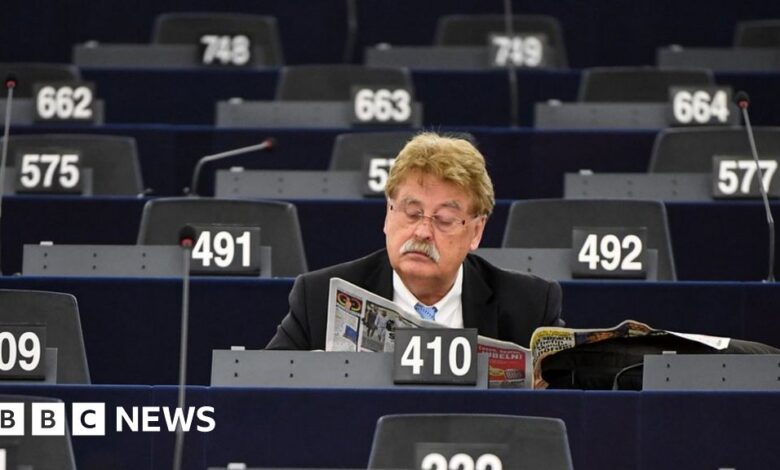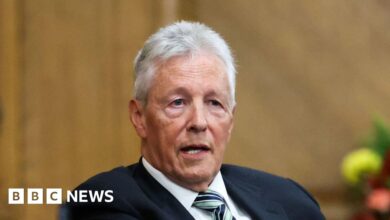Week ahead in the European Parliament

 EPA
EPAThe European Parliament meets amid increasing tension over plans designed to avoid a hard Irish border after Brexit.
EU chief Brexit negotiator Michel Barnier has poured cold water over a UK proposal for a “backstop” customs arrangement.
European leaders are due to evaluate progress at a keenly-awaited EU summit at the end of June, which MEPs will discuss on Tuesday morning.
The European Parliament’s Brexit point-man Guy Verhofstadt has been distinctly sniffy about the UK’s current plan too.
He has said it is difficult to see how the UK’s suggestions would provide a “workable solution” to the border conundrum and respect EU rules.
Whilst the Brexit clock is certainly ticking, MEPs will also be keen to discuss plans for reform of the eurozone which will also be on the summit agenda.
Wednesday morning will provide another chance to see what a European leader makes of it all, when Dutch Prime Minister Mark Rutte will become the latest to outline his vision for the future of the EU with a speech in the Strasbourg chamber.
And on Tuesday, MEPs will hold a final vote on legislation introducing the EU’s first powers to regulate smaller drones.
Here’s a run-down of the week ahead…
Monday
Business gets underway with a debate on new EU rules for the trade in privately negotiated derivatives.
The legislation will set out a new method for calculating whether an investment firm must get a derivative contract cleared by a recognised clearing house.
MEPs are likely to suggest amendments to the legislation at a vote on Tuesday, before negotiations with national ministers get underway.
 PA
PAAfter this, they will debate legislation to expand the remit of the EU’s air safety regulator, including its first powers to regulate smaller civilian drones.
Regulators have pledged to strike a balance between improving safety and not throttling the nascent industry at birth with burdensome rules.
Under the proposed compromise, drones that can transfer more than 80 joules of kinetic energy upon impact with a person will have to be registered.
The compromise deal on the new rules will be put to a final vote on Tuesday.
The UK has already announced its own registration scheme, which will see owners of drones weighing more than 250g required to sit a test.
Then MEPs will debate new carbon dioxide reporting requirements for firms that manufacture heavy duty vehicles (HDVs).
Under the new rules, companies will have to report data each year on the carbon dioxide emissions and fuel consumption of newly registered HDVs.
The European Commission will get powers to fine companies for not reporting or falsifying data. A final vote is again expected on Tuesday.
In the evening MEPs will debate advisory policy suggestions on the education sector, shellfish farming and recreational fishing.
Tuesday
The morning sitting begins at the usual time of 08.00 BST with the debate on this month’s EU leaders’ summit in Brussels.
After the summit debate, MEPs will discuss in greater detail one item on the agenda – new rules for the governance of the eurozone.
It comes after German Chancellor Angela Merkel recently backed a plan to create a European Monetary Fund from the eurozone’s existing rescue fund.
After the voting session, the afternoon sitting kicks off with a debate on how the 2015 Iran nuclear deal can be kept on the road.
The EU has expressed its intention to preserve the deal, despite Donald Trump’s decision to withdraw the US from the agreement last month.
 AFP
AFPAfter this, they will debate an advisory report with recommendations for updating the EU’s 2002 association agreement with Chile.
This will be followed by a debate on the Russian-controlled regions of South Ossetia and Abkhazia – both recognised as Georgian territory by the West.
The two regions were recognised by Russia as independent states following the 2008 Georgian-Russian war, whose tenth anniversary is this summer.
Then, there’s a debate the future of EU-Nato relations and a new €1bn package of EU loans to support Ukraine, which faces a final vote on Wednesday.
The last package of loans was cancelled by the EU earlier this year, after claiming Ukraine had failed to implement certain anti-corruption measures.
Further loans will be conditional on new obligations to fight corruption and the setting up of a specialised anti-corruption court.
The evening will conclude with debates on reports on cyber defence and the EU’s cohesion policy.
Wednesday
The first debate is on a favourite subject for the European Parliament – implementation of the Istanbul Convention, an international treaty which aims to reduce violence against women and girls.
MEPs have been regularly calling on EU states that have not yet done so to ratify the accord – only 18 of the 28 have done so far.
In some countries the procedure has become bogged down amid debates over the implications of the use of the word “gender” in the treaty.
After this they will hear – and then debate – the speech from Dutch Prime Minister Mark Rutte.
At the voting session, MEPs will decide whether to endorse a draft decision by EU leaders to shrink the European Parliament from 751 to 705 following Brexit.
Approval would allow leaders to give final approval to the plans at the summit later this month. It will determine the size of the assembly from 2019 until 2024.
Under the changes, 27 of the UK’s current 73 seats will be redistributed among member states to take into account recent population changes.
The remainder would remain in reserve in case more countries join the EU. A plan to create a pan-EU constituency with them was rejected by MEPs in February.
 EPA
EPAThe afternoon sitting kicks off with a debate on the EU’s ongoing probe into Poland’s planned overhaul of its judiciary.
The European Commission says some of the changes would undermine the rule of law – a charge vehemently denied by Warsaw.
It comes as one element of the overhaul – a reduction in the retirement age of Supreme Court judges – is due to take effect in July.
After this they will discuss legislation requiring EU countries to conduct “proportionality tests” before introducing new rules for regulated professions.
The EU tabled the measure last year in a bid to ensure national rules do not make it unduly difficult for professionals to move around the bloc.
After this they will debate a report with suggested improvements to existing Cotonou Agreement, which expires in 2020.
The treaty sets out human rights conditions for EU trade deals with 78 African, Caribbean and Pacific countries.
The evening will see debates on the EU’s Roma integration strategy and efforts to combat ivory poaching.
Thursday
The day begins with a debate on the EU’s role in helping to fight corruption in member states.
A committee of MEPs wants the European Commission to explain why an EU anti-corruption report due in 2016 has not been published.
After this they will debate this month’s three human rights motions, which will be put to a vote just before lunchtime.
Also facing a vote will be the new requirement for “proportionality tests” for new rules for regulated professions debated on Wednesday.
Please note: This agenda is subject to modification at the opening of the session on Monday afternoon.
A guide to the European Parliament’s plenary sessions can be found here.
Source link




